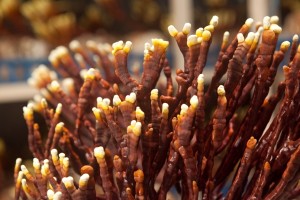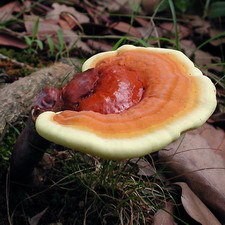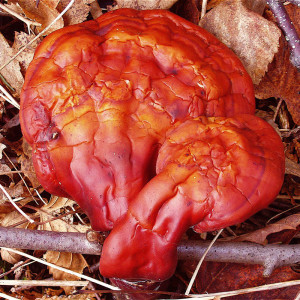Reishi is the Japanese name for Ganoderma lucidum, a mushroom known as Ling zhi in Chinese medicine. Similar species are found from the Amazon rain forest to the Arctic and have similar tonic uses. The mushroom is known to be powerful and features in myths about raising warriors from the dead. While it lacks that specific property, the mushroom is used for everything from increasing blood quality to treating cancer. Mycelial extracts done well on wooded substrates have similar to superior healing characteristics to those of the whole mushroom according to mycologist Paul Stamets. Nonetheless the mushroom itself excites users, with its antler or mushroom forms and red shiny surface.
The ganodermas (black G. lucidum, red G. lucidum, G. oregonense, G. tsuga, G. adspersum and G. applanatum) are tonic, immune strengthening, protect against cancer, have anti-tumor properties, calm the spirit, protect and clear heat from the central nervous system, open the heart, lower serum cholesterol and are good for adrenal fatigue and for depression and anxiety. They enter all five zang organs. They have anti-allergic effects, inhibiting histamine production and stabilizing immunoglobulin levels. They lower blood pressure, are antioxidant, antiviral and antibacterial. Combining with astragalus, atractylodes and Ren shen increase phagocytosis, promote immune globulin formation, promote lymphocyte transformation, and induce the generation of interferon. Chinese mountain climbers use Ling zhi to alleviate altitude sickness by oxygenating the blood.
I learned from a Thai doctor with a cancer practice, Santi Rosswong, to make a water decoction of Ganoderma lucidum (Ling zhi) with 10% cordyceps [Dong chong xia cao] for stamina. But since the polysaccharides in ganoderma are quite long, it has been shown to be more effective if the decoction is taken with not less than 500 mg of vitamin C, and 5 mg of folic acid each time. (The vitamin C is based upon Japanese research by Morishige and the folic acid is based upon Santi’s clinical experience.) Take several tablespoons (or more) every three hours. The most important dose is just before retiring, which should be larger. Take the folic acid and vitamin C with each dose.
There are two types of tinctures. One uses a concentrated decoction and adds alcohol to stabilize it. When I make it, I learned from Chris Hobbs to shoot for 25% alcohol to protect the polysaccharides, to ensure that I got between 22% and 28%, the lower number for spoilage and the upper number being a maximum for the polysaccharide protection. This appears to be the best formulation for immune system effects. The other way is to use a high alcohol formation to get the triperetenes, but I understand that this destroys the polysaccharides and differs significantly from the constituents extracted in traditional uses or from powdered extracts. It may have stronger CNS effects however. I know several herbalists who make a high alcohol tincture and add it to the subsequently decocted marc to get the best of both (and they understand that the high alcohol just makes the polysaccharides clump together on the side of the tincturing vessel but does not destroy them). There is not a consensus.
Ling zhi has various steroidal compounds, long chain polysaccharides, bitter triperetenes such as ganodermic acid and some volatile oils. Unlike Echinacea which activates macrophages, ganoderma is not believed to stimulate the immune system directly. It is probably an immune regulator rather than an immune stimulant. Ling zhi mushrooms get to the bone marrow and induce the marrow to put on more nucleated marrow cell mass, according to Jia. The marrow then increases B-cell production, which in turn increases antibodies. The DNA and RNA made in the bone marrow increases production of lymphocytes. This very deep immune nourishing means that it may be appropriate for AIDS patients although the patient should not suffer from undue dampness. For cancer therapy, combined with other fu zheng herbs, Ling zhi can be quite useful, even for patients undergoing chemo and radiation. Hobbs recommends low dose decocted ganoderma with cinnamon bark and orange peel as a tonic drink (for those not suffering from undue dampness) and I find that preparation, with roasted dandelion or chicory, combines well with coffee, helping neutralize coffee’s negative effects.
(Karen S Vaughan, adapted from Chinese Herbal Academy post 8-26-2000)



